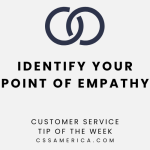
Sometimes we’re meeting the customer for the first time. It’s going to be a brief conversation, but we still want them to end the conversation feeling valued, comfortable, and confident – we want them to have a great experience.
Maybe there’s not enough time to establish a relationship, especially if you only have 90 seconds with the customer. So how can you at least establish a healthy rapport?
First, initiate and greet. Go to them, if possible, to initiate the conversation. Let them know you’re available and happy to help. Greet with some energy (not overbearing, but definitely not flat). Focus on them, and be friendly/courteous.
Second, make it all about them. Ask about their interest, their issue, need, or goal. Asking puts the focus on what’s important to them, making them feel important and valued. Restate your understanding to convey their situation is understood, and make it conversational – flowing dialogue is often key to rapport-building.
Third, share a little about you. It’s all about them, so what they need to know about you is that which makes them feel valued, comfortable, and confident. Valued – how what you do addresses their need. Comfortable – use your name to personalize. Confident – convey that you’ve helped others in similar situations.
Finally, let non-verbal factors communicate for you. Ensure that your body language and tone of voice back up what you’re trying to accomplish with your words. Engage with the body language, expressions, and tone in a manner that conveys you’re focused on them, empathetic, positive, and service-oriented.
Regardless of how much time you have with the customer, communicate in such a way as to engender positive feelings about you and your organization.
Establish rapport in 90 seconds.
Signup for FREE Tips! Contact Us More Resources for You Visit Our Home Page























